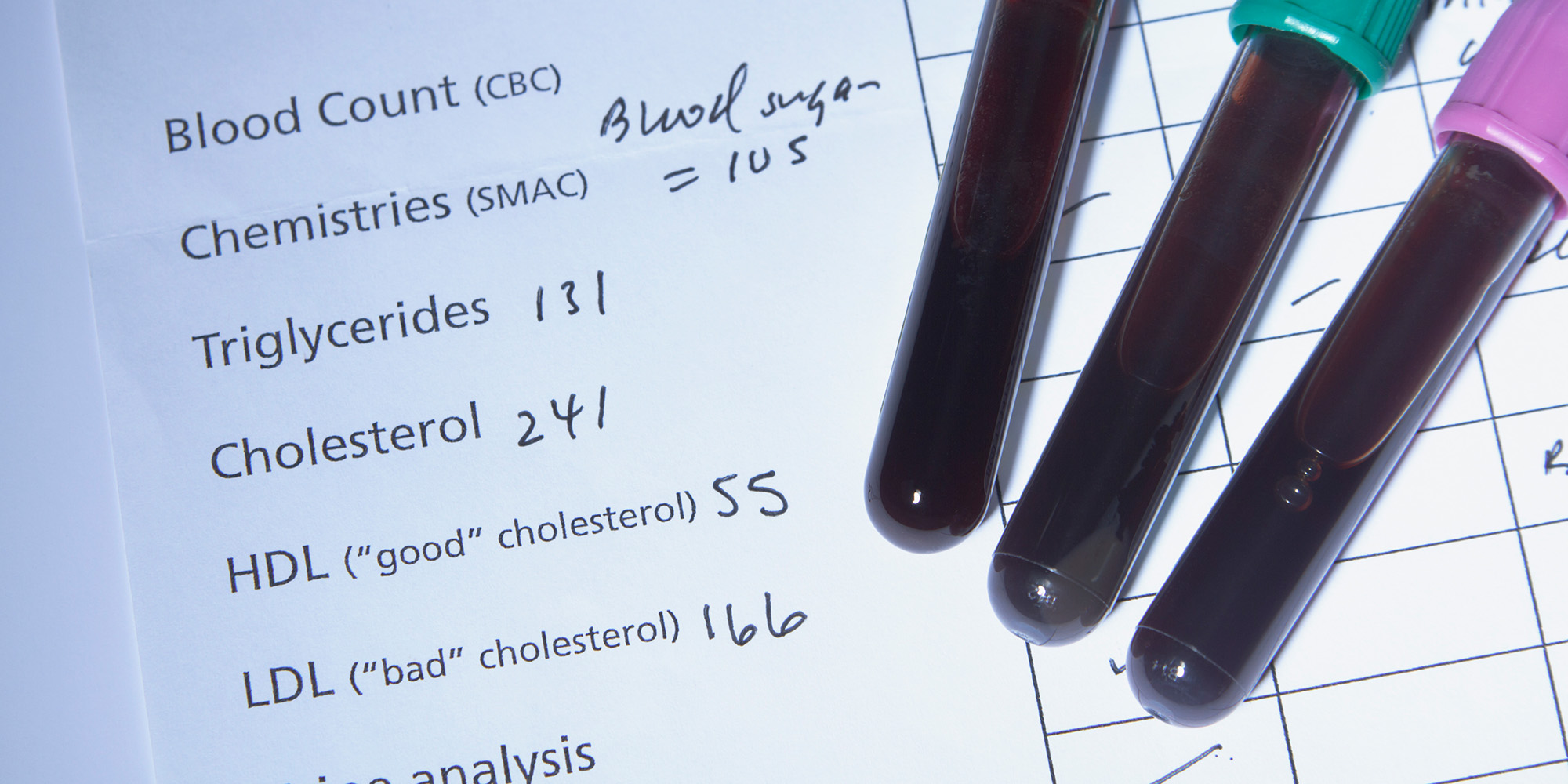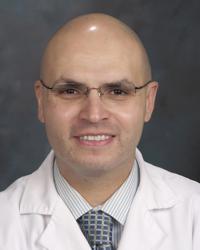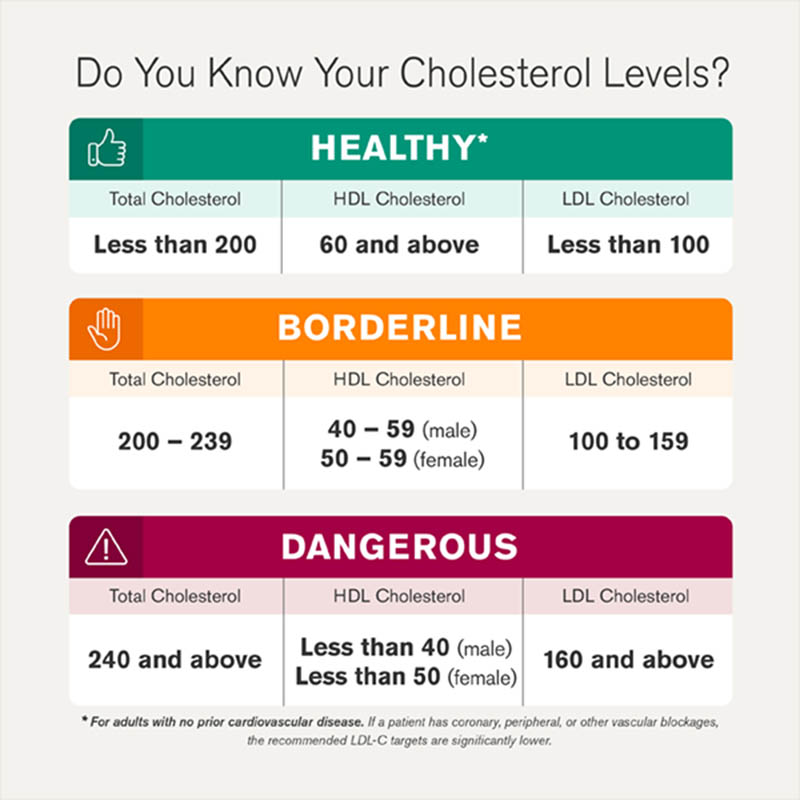7 Frequently Asked Questions About Cholesterol
October 12, 2024
Categories: Heart & Vascular, Health & Wellness
Tags: cholesterol disorders
 By Khaled Dajani, MD, Cardiology
By Khaled Dajani, MD, Cardiology
Cholesterol is a type of lipid (or fat) in the blood that is essential for good health. But having too many lipids in your blood, known as high cholesterol, can cause serious health problems. Roughly 86 million Americans have this condition.
“If you’re over the age of 20, you should have your cholesterol checked every five or six years,” says Loyola Medicine cardiologist Khaled Dajani, MD.
“You may have high cholesterol and not know it, since there are no immediate symptoms. By knowing your numbers, you can take steps to reduce your cholesterol levels and your risk of heart attack and stroke.”
Dr. Dajani answers seven questions patients frequently ask about cholesterol.
Why is cholesterol important?
Cholesterol is a fat-like substance produced by your liver. Your body uses cholesterol to make:
- Cell membranes
- Chemicals that carry messages throughout your body (hormones)
- Fat-dissolving acid (bile) that helps digest food
- Vitamin D
Animal-based foods, such as meat, fish, eggs and full-fat dairy products, contain cholesterol, but you don’t need much in your diet — your liver makes all your body requires.
What are the different types of cholesterol?
Cholesterol is a waxy substance that cannot travel in the bloodstream alone. “Your liver packages cholesterol inside a shell made of fats (lipids) and proteins,” says Dr. Dajani.
“This lipoprotein shell acts like a vehicle, carrying cholesterol throughout your body.”
The types of lipids in your blood include:
- Low-density lipoproteins (LDLs) carry cholesterol to your cells.
- High-density lipoproteins (HDLs) collects excess cholesterol and carry it back to your liver.
- Triglycerides: Triglycerides are a type of fat in your blood that serve as an energy source. Your liver converts excess fat and sugar in your diet into triglycerides.
Ideally, you should strive for low LDL, high HDL and low triglycerides.
What are the effects of high cholesterol?
The main risk of high cholesterol is hardening of the arteries (atherosclerosis). Atherosclerosis is a slow process that occurs over many years. It starts when LDL and other substances build up inside an artery, forming plaque. The plaque causes your artery to narrow and become less flexible.
As the plaques grow, they can restrict or even block blood flow. Plaques can also break off and form blood clots that can get stuck in the narrowed artery.
A heart attack occurs when a blood vessel that carries fresh blood to your heart muscle (coronary artery) becomes blocked. A stroke is when a blockage occurs in your brain.
What causes high cholesterol?
There are many factors that lead to high cholesterol. Factors you cannot control include:
- Age: As you get older, your cholesterol levels naturally increase.
- Family history: Cholesterol disorders can run in families. For example, familial combined hyperlipidemia causes high LDL cholesterol and triglycerides.
- Gender: Women typically have lower LDL levels than men, though this difference disappears after menopause.
Additional factors are related to lifestyle choices and other preventable health conditions, such as:
- A diet high in bad fats, such as saturated and trans fats
- Carrying excess weight
- Metabolic syndrome
- Not getting enough exercise
- Smoking
- Type 2 diabetes
How do I know if I have high cholesterol?
A cholesterol test is a routine part of preventive care. Primary care providers typically order this blood test as a screening tool to find cholesterol problems early.
The test measures milligrams of cholesterol per deciliter of blood (mg/dL). Your doctor will talk to you about what your cholesterol test results mean and steps you can take to achieve healthy levels.
It's also important for patients to be proactive and bring up with their physician or health care provider their individual target LDL-C level and, if needed, ask for referral to a lipid specialist for treatment.

How does cholesterol affect my risk for cardiovascular disease?
Your doctor can use your cholesterol numbers and other health information to calculate a cardiovascular risk profile. Your profile includes your estimated chance of a cardiovascular event over the next 10 years and over your lifetime.
Based on these estimates, your doctor can recommend specific lifestyle changes or prescribe medications.
Another test doctors use to assess your cardiovascular risk is a coronary artery calcium scan. This CT scan measures the plaque deposits inside your coronary arteries and converts the amount to a score. Coronary artery calcium scores range from zero (no risk) to more than 400 (high risk).
How can I lower my cholesterol?
If your cholesterol levels need improvement, changing your lifestyle is the most important thing you can do, says Dr. Dajani. Changes you can make include:
- Achieving a healthy weight
- Eating a heart-healthy diet
- Exercising more
- Quitting smoking
Your doctor may also prescribe medications. “Statins are the main medications we use to lower LDL,” says Dr. Dajani.
“In my opinion, statins remain 'king' and should be the first line of therapy. If the desired LDL-C is not achieved, or there are intolerable side effects, these newer medications are increasingly utilized.
Besides PCSK-9 inhibitors, which are a newer, more powerful class of drugs that lower LDLs and triglycerides and increase HDL levels, there are now additional medications available, including mRNA inhibitor inclisiran and acetyl cyclase inhibitors like bempedoic acid.
But even with these drugs, lifestyle modifications are key. We never prescribe medications without recommending lifestyle changes."
Preventive cardiology at Loyola Medicine
Preventing heart disease can help you live longer and healthier. Loyola’s preventive cardiology and lipid program at our Burr Ridge location is for patients who need help lowering their cardiovascular disease risk.
In addition to cardiology, this clinic offers nutrition, exercise and smoking cessation counseling. You receive a full assessment for cardiovascular risk factors, including a medical history, genetic testing and screening tests.
The field is rapidly growing and we are helping many patients achieve the desired LDL-C levels that is so important to avoid adverse cardiovascular events, including strokes and heart attacks.
Once we identify your risk factors, we provide detailed recommendations and support to help you address them.
To make an appointment with the preventive cardiology and lipid program, call 888-584-7888 or schedule an appointment online.
Khaled Dajani, MD, is a cardiologist at Loyola Medicine who is certified in cardiovascular disease, cardiovascular CT and nuclear cardiology. Dr. Dajani earned his medical degree from the University of Illinois College of Medicine. He completed fellowships at Henry Ford Hospital and the Hospital of the University of Pennsylvania.
Dr. Dajani’s research interests include preventing coronary artery disease through strategies such as diet, medications and behavioral cardiology.
Book an appointment today to see Dr. Dajani or another Loyola preventive cardiologist by self-scheduling an in-person or virtual appointment using myLoyola.
